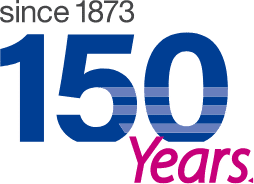A well-known manufacturer from the chemical industry placed an order with us for the delivery of a JEL Regula Standard for the classification of EPS granulate. Important condition: Short delivery time
The screening machine is to extend an existing plant for which Engelsmann had already supplied several machines of the same type. This project example shows how we planned, manufactured and integrated the JEL Regula Standard classifying screening machine into the plant in record time.
Expandable polystyrene (EPS) is a foam and consists of 98 % air. It has an excellent insulating value, is light, yet dimensionally stable and, unlike other insulating materials, hardly absorbs moisture. EPS is used as a raw material for numerous products and applications: in the building and construction industry, the packaging industry, in gardening, road construction or hydraulic engineering and for much more. It is easy and safe to process and is fully recyclable.
Expandable polystyrene is an established product in Europe, known by many names. Today, the EPS industry uses a common European name for EPS: airpop® engineered air. However, the production process has remained the same: EPS granulate is first produced from styrene and other components in a polymerisation process. This is then dried, sieved and further processed in several steps. In the end, it can be pressed into a homogeneous EPS end product and shaped into any desired form.
The requirements with regard to the required particle sizes and thus also the screening technology used are therefore correspondingly diverse. In addition, within the plant expansion, conversion measures were carried out at the customer’s site. A tight schedule had to be adhered to so that the machine could be installed directly. This meant a significantly shorter delivery period for the JEL Regula Standard than it would otherwise be the case in comparable projects.

EPS: The granulate is light and airy. Special screening technology is needed to implement a selective classification.
The JEL Regula Standard linear stroke screening machine is individually tailored to the customer’s requirements.
For the classification of EPS, the screening machine for this project was equipped with a screening surface of almost 18 m² and 19 screen decks. This enables the EPS granulate to be separated into up to three fractions as well as the removal of oversize and undersize particles.
Classification screening is carried out from fine to coarse and achieves a screening efficiency of over 98%. For this purpose, the JEL Regula is equipped with stacked sieve inserts whose mesh becomes increasingly wider from top to bottom.
The coarse material is carried along within the screening material until the end and serves as a screening aid. During the screening process, the product flow can be controlled from the outside via adjustable distribution sliders to ensure even utilisation of all screen decks. The machine does not have to be stopped for this.
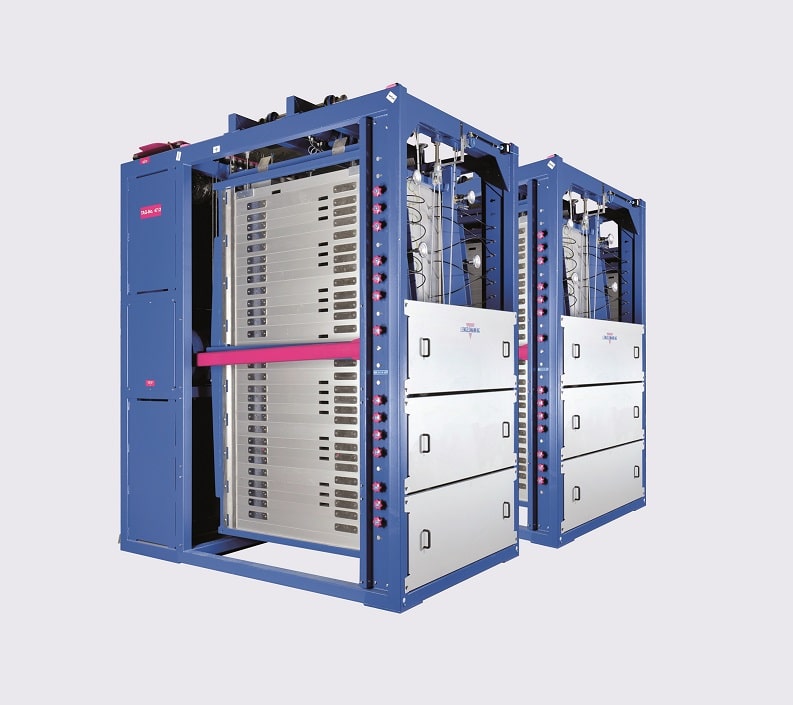
JEL Regula Standard for dry bulk materials: Several fractions can be classified dust-tight within one screening pass.
An adjustable screen inclination, product distribution plates and an integrated screen cleaning system ensure continuous throughput and an extremely sharp classification result. The screen mesh is cleaned and kept free by the impact balls of the cleaning system hitting the screen mesh from below due to the lifting movements of the machine. Plugged-in particles, i.e. particles that correspond in size to the mesh sizes of the screen fabric and have become stuck, are loosened and conveyed back into the product flow. The entire surface of the sieve inserts can thus be fully utilised – for maximum throughput.
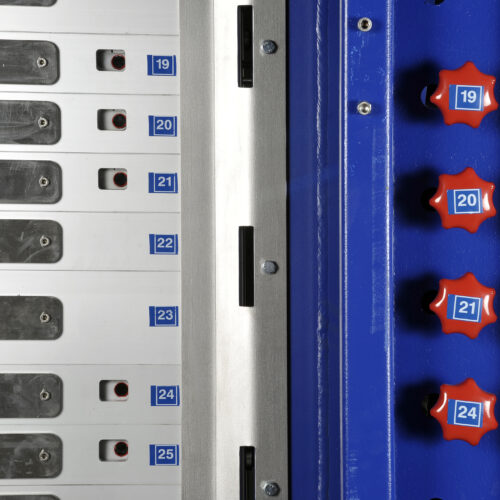
Distribution slides for optimum sieve quality: They are easily accessible from the outside and can also be adjusted during operation.
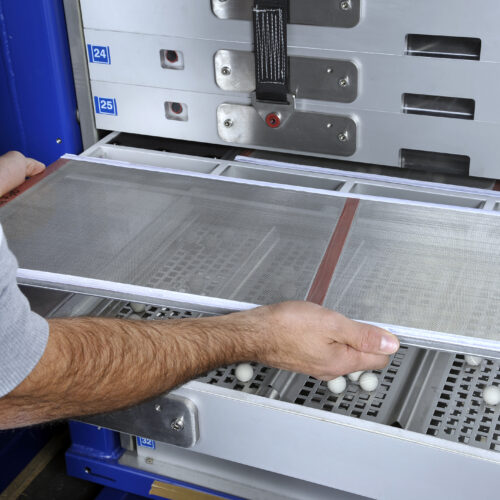
The impact balls of the cleaning system keep the screen fabric free – for consistently high throughput.
High productivity, short downtimes, low energy consumption and small footprint
In addition to the reliable operation, a decisive factor for the customer was the small space requirement of the classifying screen.
For this application, the screening machine is equipped with a screening area of almost 18 m² and 19 screen decks. Thanks to the compact design of the base frame with integrated sieve stack, the JEL Regula Standard could be integrated precisely into the EPS manufacturer’s plant.
The linear stroke screening machine is driven by an electric motor that transmits its power to a flywheel mass by means of a V-belt. This flywheel mass is precisely matched to the mass of the screen feeders (plus EPS granulate). Mass balancing largely prevents vibrations emanating from the machine.
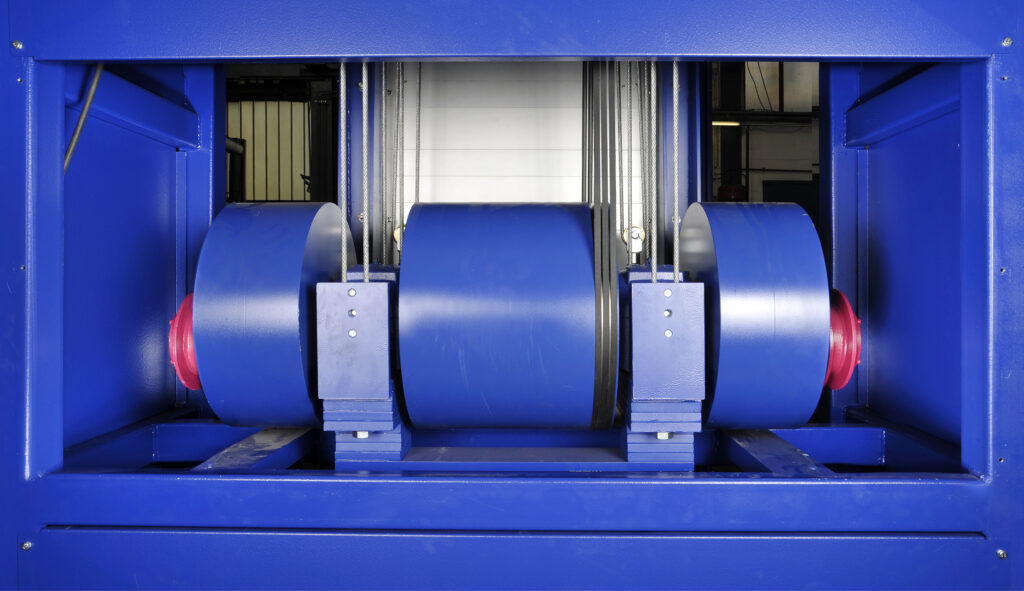
Low energy consumption included: 3.5 kW with a screening surface of nearly 18 m². Once in motion, the kinetic energy stored in the flywheel is gradually released. In this way, the classifying screening of the EPS granulate can be carried out very energy-efficiently.
An electric lifting device makes changing the screen on the JEL Regula Standard as easy as on a single-deck screening machine. Even when the screening machine is equipped with several screen decks for classification into different fractions.
Each screen frame can be docked individually and the screen deck above it lifted. The inserts of the screen deck below are then freely accessible and easy to pull out. They can be changed without having to remove other frame parts or carry out additional disassembly work – for minimum downtimes when changing screen inserts. Cleaning, maintenance and repair work are also made much easier. All this ensures high productivity in the classifying screening of EPS granulate.
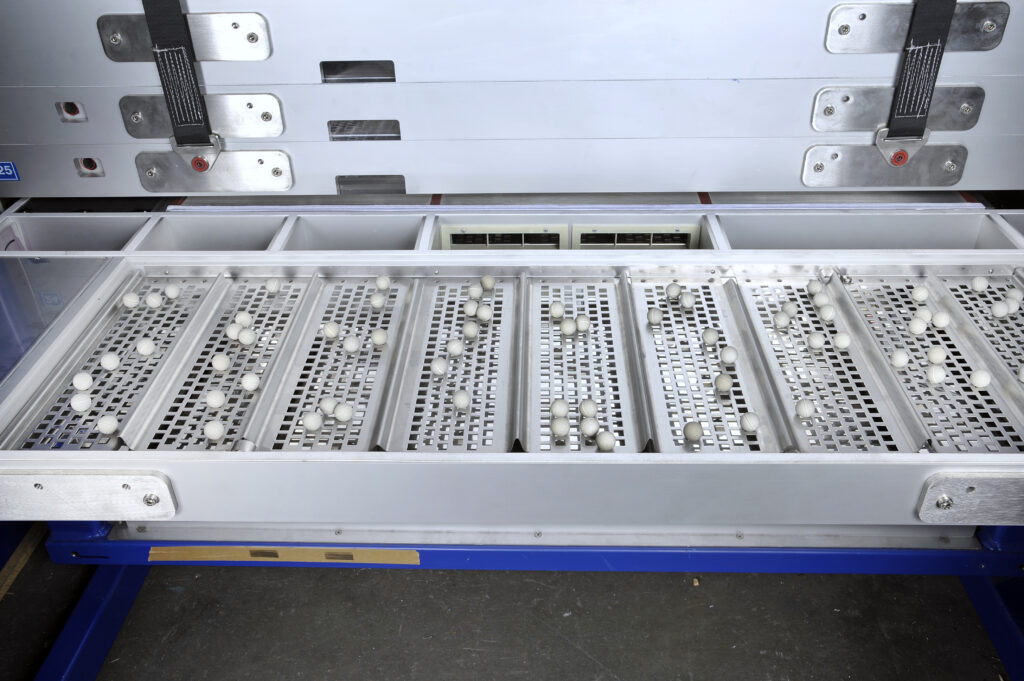
The sieve inserts can be removed and changed individually – without time-consuming disassembly work. This reduces downtimes for regular cleaning work enormously.
The JEL Regula Standard linear stroke screening machine can be equipped with up to 22 screen decks. This corresponds to a maximum screening surface of 20m² over which the screening material can be moved and classified into up to eight fractions per screening pass. It is available as an ATEX version and can also be used in potentially explosive areas.

